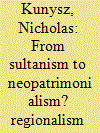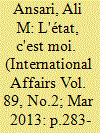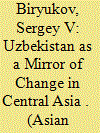| Srl | Item |
| 1 |
ID:
110787


|
|
|
|
|
| Publication |
2012.
|
| Summary/Abstract |
This paper proposes that under President Berdimuhamedov, the government of Turkmenistan has begun to move away from the 'sultanism' of the Niyazov era. Instead, the new government exhibits characteristics and has pursued policy changes that prepare conditions for the further development and entrenchment of localized networks of elites based on kinship. Such changes suggest that the government of Turkmenistan may develop into a more classic neopatrimonial system of authoritarian governance similar to the other post-Soviet republics in Central Asia. This argument is advanced by examining changes between the governments of former President Niyazov and Berdimuhamedov with regard to three areas of the Turkmen state's relationship with its constituent regions: regional composition of the national cabinet; hakim (governor) policy; and regional development. This examination relies largely on a comprehensive survey of online Turkmen state-media sources, as well as numerous supportive secondary sources.
|
|
|
|
|
|
|
|
|
|
|
|
|
|
|
|
| 2 |
ID:
119446


|
|
|
|
|
| Publication |
2013.
|
| Summary/Abstract |
In August 2009, in the aftermath of the popular protests that followed the highly controversial elections of that year, the Iranian authorities arrested hundreds of intellectuals/activists and charged them with sedition against the state.
What was more peculiar was the decision to accuse 'in absentia' a number of western intellectuals for their role in fomenting the crisis, not least the long deceased German sociologist Max Weber. Weber was publicly denounced for his analyses of patrimonialism and sultanism, and their capacity for change. In sum, Weber was being accused of providing the ideological blueprint for 'regime change'.
This article looks at the way in which the concept of 'regime change' has been increasingly used as a political tool to suppress dissent within Iran and argues that far from being seditious, Weber's ideas remain more relevant today in Iran than they ever were. The prospect of 'regime change' remains more a product of the paradoxes of sultanism, than any threat - real or imagined - from abroad.
|
|
|
|
|
|
|
|
|
|
|
|
|
|
|
|
| 3 |
ID:
164971


|
|
|
|
|
| Summary/Abstract |
Central Asia is anticipating a transformation related to the need for further multifaceted modernization. However, different conditions dictate different strategies. The development model of Uzbekistan was mostly defined by Islam Karimov, whose death marked the beginning of profound changes associated with the transformation of the sultanistic regime.
|
|
|
|
|
|
|
|
|
|
|
|
|
|
|
|